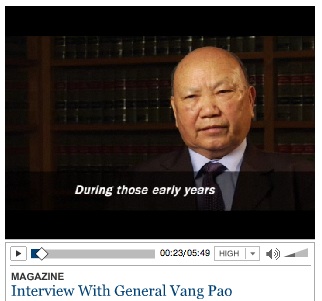General Vang Pao's Last War
Early in 2007, the Madison School Board decided to name a new far west side elementary school after Vang Pao. This decision became ingreasingly controversial after Pao was arrested as part of a plot to overthrow the Laos Government (the school has since been named Olson Elementary).  Tim Weiner, author of Legacy of Ashes digs into this latest chapter in the Hmong / US Government relationship:
Tim Weiner, author of Legacy of Ashes digs into this latest chapter in the Hmong / US Government relationship:
The case against Vang Pao grew out of a sting operation, a crime created in part by the government itself. What evidence there is rests largely on secretly recorded conversations led by an undercover federal agent, and while the transcripts implicating some of the co-defendants in the case seem damning, the agent barely met Vang Pao. The talk between them was brief; though Vang Pao may have dreamed aloud of a glorious revolution in Laos in years gone by, his role in the conspiracy charged by the government may be hard to prove. The government presents the case as a clear-cut gunrunning conspiracy in violation of the Neutrality Act, which outlaws military expeditions against nations with which the United States is at peace. But the old general’s defenders contend that the case against him is the consequence of a misguided post-9/11 zeal. If convicted in a trial, the former American ally could face the rest of his life in prison. And already his indictment has apparently emboldened Laotian and Thai authorities to crack down on the beleaguered Hmong who remain in refugee camps or in hiding in the jungles of Laos.
The government has a checkered record of late in its sting operations against people subsequently charged with planning acts of political terror. In 2006, to take one example, Attorney General Alberto Gonzales announced that a joint terrorism task force had broken up a plot to “levy war” and to blow up the 110-story Sears Tower in Chicago. In that case, as two trials have shown, an F.B.I. informant known to the defendants as Brother Mohammed created some of the key evidence — leading the group in an oath of loyalty to Al Qaeda, for instance. He provided them with plans and plots and gave them military gear like combat boots. The defendants never had contact with actual terrorists, never obtained weapons or explosives. Two juries have failed to see the logic of the case; a federal judge has had to declare two mistrials. (The government plans to try the case a third time.)
The sting operation against Vang Pao exhibits some similar traits. It has also dismayed a number of American intelligence officers who worked with the Hmong against the army of North Vietnam in the 1960s and 70s. “We taught him how to do these things — to fight political warfare, to try to defeat the enemy,” I was told by Larry Devlin, a former C.I.A. station chief who worked with the general in Laos. “We helped Vang Pao learn to do some of the things that he and his troops are now charged with.”
Britannica on the
Hmong.
Posted by Jim Zellmer at May 12, 2008 6:15 AM
Subscribe to this site via RSS/Atom:  Newsletter signup | Send us your ideas
Newsletter signup | Send us your ideas


 | Newsletter signup | Send us your ideas
| Newsletter signup | Send us your ideas Newsletter signup | Send us your ideas
Newsletter signup | Send us your ideas